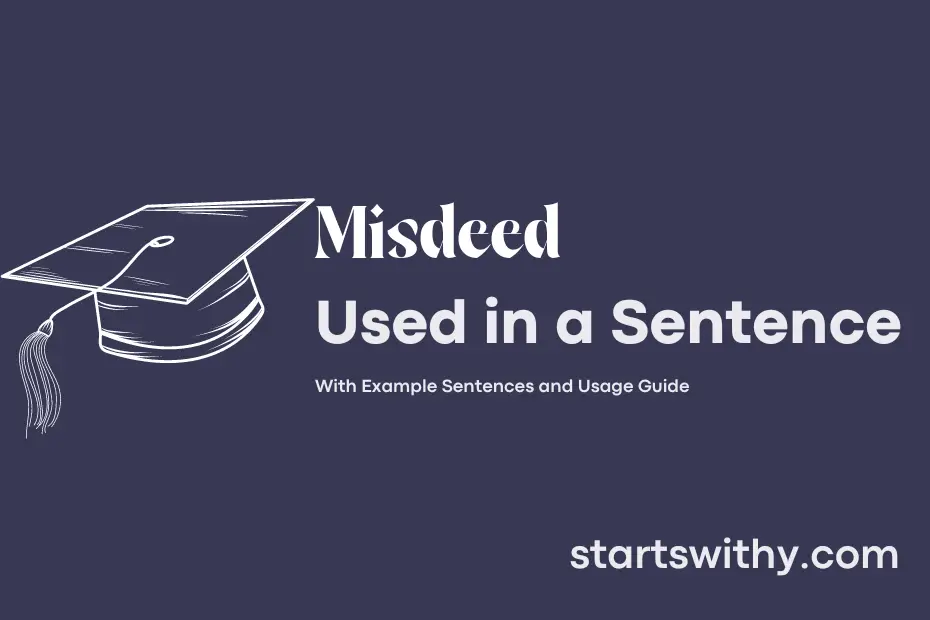Have you ever wondered what the term “misdeed” actually means? In simple terms, a misdeed refers to a wrongful or immoral act committed by an individual.
Often used in the context of ethics, law, or social conduct, a misdeed can range from small infractions to more serious offenses. It typically implies that someone has acted in a way that goes against established norms or rules, leading to harm or detriment to others.
7 Examples Of Misdeed Used In a Sentence For Kids
- Misdeed is when we do something wrong.
- It’s important to always try to avoid misdeeds.
- We should always be honest and not do any misdeeds.
- If we make a misdeed, we should say sorry and try to make it right.
- Being kind to others helps us stay away from misdeeds.
- It’s always better to choose to do good things instead of misdeeds.
- Remember, misdeeds can hurt others and make us feel bad too.
14 Sentences with Misdeed Examples
- Misdeed: Cheating in exams is considered a serious misdeed in college.
- As a responsible college student, you should avoid any form of misdeed that could tarnish your reputation.
- It is important to report any instance of misdeed to the college authorities for appropriate action to be taken.
- Engaging in any form of misdeed can have severe consequences, including expulsion from college.
- Students should be aware of the consequences of committing a misdeed and strive to maintain integrity in all their academic endeavors.
- Misdeeds such as plagiarism and academic dishonesty are strictly prohibited in college and can result in disciplinary action.
- Bribing a professor for better grades is a serious misdeed that can have long-lasting repercussions on a student’s academic career.
- College students should adhere to the code of conduct set by the institution and refrain from any form of misdeed.
- It is essential for college students to uphold moral values and avoid engaging in any misdeed that compromises their integrity.
- Students who are found guilty of committing a misdeed may face academic penalties such as suspension or academic probation.
- Engaging in acts of vandalism on campus property is considered a serious misdeed and can lead to legal consequences.
- Misdeeds can damage the reputation of both the individual student and the college as a whole.
- As responsible members of the college community, students should be vigilant in reporting any instances of misdeed they witness.
- It is important for students to understand the gravity of committing a misdeed and the impact it can have on their academic and professional future.
How To Use Misdeed in Sentences?
To use the word Misdeed in a sentence, begin by identifying a situation where someone has done something morally wrong or illegal. For example, “His misdeed of stealing money from the charity fund was discovered by the authorities.”
When constructing a sentence with Misdeed, remember that this word refers to any wrongful or dishonest act that goes against accepted behavior or ethics. You can use it to describe various actions, from minor offenses to serious crimes. For instance, “The teacher reprimanded the students for their misdeeds during the field trip.”
Ensure that the context in which you use Misdeed is clear to the reader. You can provide additional details or examples to illustrate the nature of the wrongdoing. For instance, “Despite his reputation for honesty, his recent misdeed of cheating on the exam shocked his classmates.”
Lastly, make sure that the sentence is grammatically correct and flows well. Consider the tone and intensity you want to convey when using Misdeed in your sentence. Remember, the word Misdeed emphasizes the negative actions of an individual, so choose your words thoughtfully to accurately portray the severity of the offense.
Conclusion
In conclusion, sentences with “misdeed” refer to statements describing a wrongful or immoral act committed by an individual or group. These sentences often highlight the negative implications of such behavior and communicate the sense of wrongdoing or misconduct involved in a specific action. By using “misdeed” in sentences, writers and speakers can effectively convey the severity and seriousness of the misconduct being discussed, whether in a legal context or in everyday conversations.
Whether it is used in a legal proceeding to address a specific offense or in personal conversations to express disapproval of someone’s actions, sentences containing “misdeed” serve as a powerful tool for emphasizing ethical and moral standards. Through these sentences, individuals can underscore the importance of accountability and responsibility, encouraging an understanding of the consequences of one’s actions on both individual and collective levels.



